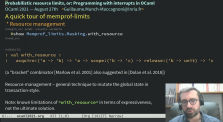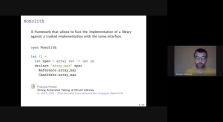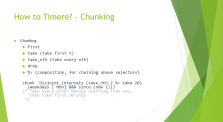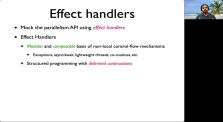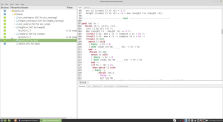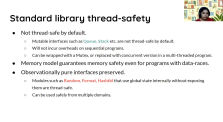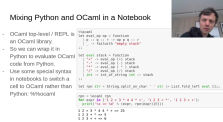Blog
The OCaml Planet RSS
Articles and videos contributed by both experts, companies and passionate developers from the OCaml community. From in-depth technical articles, project highlights, community news, or insights into Open Source projects, the OCaml Planet RSS feed aggregator has something for everyone.
Want your Blog Posts or Videos to Show Here?
To contribute a blog post, or add your RSS feed, check out the Contributing Guide on GitHub.
Regular CI systems are optimised for workloads that do not require stable performance over time. This makes them unsuitable for running performance benchmarks. current-bench provides a predictable environment for performance benchmarks and a UI...
The goal of this talk is two-fold. First, we present memprof-limits, a probabilistic implementation of per-thread global memory limits, and per-thread allocation limits, for OCaml 4.12. Then, we will discuss the reasoning about programs in the pre...
When testing a library, developers typically first have to capture the semantics they want to check. They then write the code implementing these tests and find relevant test cases that expose possible misbehaviours. In this work, we present a t...
Time handling is commonly considered a difficult problem by programmers due to myriad standards and complexity of time zone definitions. This also complicates scheduling across multiple time zones especially when one takes Daylight Saving Time int...
We develop ParaFuzz, an input and concurrency fuzzing tool for Multicore OCaml programs. ParaFuzz builds on top of Crowbar which combines AFL-based grey box fuzzing with QuickCheck and extends it to handle parallelism. Sumit Padhiyar Indian In...
We present the formal verification of a subset of the Set module from the OCaml standard library. The proof is conducted using Cameleer, a new tool for the deductive verification of OCaml code. Cameleer takes as input an OCaml program, annotated u...
OCaml 5.0 with support for shared-memory parallelism being around the corner, there’s increasing interest in the community to port existing libraries to Multicore. This talk will take the attendees through what the arrival of Multicore means to th...
In this talk we present how we expose a wide variety of OCaml libraries and services so that they can be accessed from Python. Our initial use case on the Python side consisted in Jupyter notebooks used to analyse various datasets, these datasets ...
This talk presents GopCaml-mode, the first structural editing plugin for OCaml. We will give a tour of the main plugin features, discussing the plugin’s internal design and its integration with existing OCaml and GNU Emacs toolchains. Kiran Gop...
Signals & Threads is back, and we have a fun season of topics lined up, including: Building better abstractions for design and user interfaces, the role of writing in a technical organization, the approach that different languages take to memory management…and more. We hope you’ll join us. The first episode drops September 1st.

